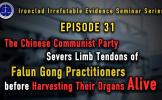Investigative Report on Spiritual Persecution
According to our incomplete statistics, by the end of 2003, during four and a half years of systematically persecuting Falun Gong practitioners, instances of using psychiatric facilities to torture Falun Gong practitioners occurred throughout China. At least one thousand Falun Gong practitioners who were completely mentally healthy people were forcibly sent to psychiatric hospitals and drug rehabilitation centers. Many people have been injected or force-fed with many kinds of drugs that damage the central nervous system. They have also been tortured with electric shock, tied up for long periods of time, force-fed and other gross abuses. Many of them have been locked up under such conditions for a long time - up to two years. Some lost their sight; some lost their hearing; others were either completely or partially disabled; some have partial or total memory loss; many were mentally traumatized; numerous ones had long-term, festering skin. In several cases, victims' internal organs were severely damaged. We have verified so far that there were at least 15 practitioners killed in the psychiatric hospitals. At least 100 psychiatric hospitals in provinces, cities, counties and districts across the nation were involved in this persecution.
This investigative report is based on testimony from Falun Gong practitioners in China, on reports from World Organization to Investigate the Persecution of Falun Gong (WOIPFG) overseas investigators and related testimony from medical personnel. Nine areas below have provided some key points that should draw high attention from international specialists.
What our investigation has discovered is only the tip of an iceberg. This due to the fact that "mental illness treatment," as used by Chinese authorities to persecute mentally healthy Falun Gong practitioners, has involved enormous numbers of practitioners. It also covers such a wide area, involving so many psychiatric facilities that have participated in it. The strict information blockage on the part of Chinese authorities makes the disclosure of the persecution using mental treatment methods extremely difficult.
Part One: Use of Psychiatric Medications to Torture Falun Gong Practitioners
Since Jiang Zemin regime announced the persecution of Falun Gong on July 20,1999, all possible open channels from inside China have continuously sent overseas the reports of psychiatric abuse of persecuted Falun Gong practitioners. These reports cover 23 provinces and regions in China. They are Beijing, Tianjin, Shanghai, Chongqing, Heilongjiang, Liaoning, Jilin, Hebei, Henan, Shandong, Shanxi, Hubei, Hunan, Jiangsu, Zhejiang, Guangdong, Guangxi, Fujian, Anhui, Sichuan, Xingjiang, Qinghai and Ningxia. At least one thousand completely mentally healthy Falun Gong practitioners were forcibly sent to psychiatric hospitals and drug rehabilitation centers in the above named regions. According to the number of the reported cases and the scope of distribution by area, this aspect of the persecution, to abuse mental drug on Falun Gong practitioners, is conducted in a systematic manner, a policy being carried out from the highest authorities to even the street administration offices.
At the end of April 2004, this investigation has discovered that from among 961 confirmed deaths of Falun Gong practitioners under the persecution, fifteen deaths were directly caused by forcible drug injections or feeding with various drugs that damage the central nervous system. The victims are:
Su Gang (male, 32, Shandong Province, Zibo City) Ma Yanfang (female, 33, Shandong Province, Zhucheng City) Yang Weidong (male, 54, Shandong Province, Weifang City) Lu Hongfeng (female, 37, Ningxia, Lingwu City) Shi Bei (female, 49, Zhejiang Province, Lanxi County) Zhao Fulan (female, 59, Heilongjiang Province, Jiamusi City) Wang Dongmei (female, 30+, Hebei Province, Hengshui City) Xiao Guiying (female, age unknown, Hunan Province, Yueyang City) Fan Lihong (female, 27, Qinghai Province, Xining City) Tang Xiaocheng (male, 40, Sichuan Province, Pengzhou City) Yu Guizhen (female, 55, Shandong Province, Pingdu City) Ma Xinxing (male, 40, Shanghai) Meng Xiao (female, 37, Sichuan Province, Chengdu City) Zhang Fangliang (male, 48, Sichuan Province, Youngchang County) Yu Lixin (male, 36, Jilin Province, Jilin City)
(Please see Appendix 1: Cases of Torture Death in Psychiatric Hospitals)
Part Two: WOIPFG Found 82.55% of Psychiatric Hospitals Investigated were Directly Involved in the Persecution of Falun Gong Under Pressure from the Participating Chinese Government
In April 2004, WOIPFG randomly investigated over 100 psychiatric hospitals in 15 provinces in China. The conclusion drawn from the investigative reports is shocking. Among the hospitals that were investigated, 82.55% of psychiatric hospitals that were scrutinized clearly admitted that they have "accepted and treated" Falun Gong practitioners, and more than half of these hospitals also clearly admitted that those practitioners had no mental problems and were admitted merely for the purpose of locking them up to force them to renounce their belief. Those medical workers knew that "accepting and treating" Falun Gong practitioners is a political task. Some psychiatric medical doctors even regarded the peaceful action of Falun Gong practitioners, who had to use hunger strikes to protest the persecution, to resist torture and brainwashing, as one of the standards to diagnose the practitioners as "mentally ill" and "accept and treat" them. These medical doctors evaluated the treatment effects based on whether Falun Gong practitioners denounced their practice and used it as a standard to decide whether they can be released from the hospital. From analysing the investigational material, from the conversations and psychological conditions of those being investigated, this investigation demonstrated that most psychiatric hospitals or wards in China have been using systematic psychiatric methods, such as the injection or force-feeding with many kinds of drugs that damage the central nervous system, and violence to persecute Falun Gong practitioners.
For example, WOIPFG reports psychiatric abuses of the persecuted Falun Gong practitioners in Beijing, Shandong, Henan, and Hebei Provinces and investigated 45 hospitals. Forty-two of the psychiatric hospitals investigated, 38 admitted to having "accepted and treated" Falun Gong practitioners in the past five years. That means 94.76% of the psychiatric hospitals in those areas were involved in the persecution. Twenty-five psychiatric hospitals declared that the Falun Gong practitioners had no mental ill symptoms, but they were detained only for them to denounce their Falun Dafa practice. Some hospitals are still "accepting and treating" Falun Gong practitioners.
Beijing psychiatric hospitals that have "accepted and treated" Falun Gong practitioners:
1. Beijing Huilongguan Hospital
2. Beijing Anding Hospital
3. Beijing Fengtai Nanyuan Hospital
4. Beijing Cangpin County Beijiao Hospital
5. Beijing Chaoyang District No. 3 Hospital (Chaoyang District Psychiatric Health Center)
6. Beijing Pinggu County Psychiatric Hospital
Shandong Province psychiatric hospitals that have "accepted and treated" Falun Gong practitioners
7. Shandong Jiaozhou Psychiatric Hospital (Jiaozhou City Psychiatric Rehabilitation Hospital)
8. Shandong Shouguang City Beiluo Psychiatric Hospital
9. Shandong Weifang City, Weifang District Rehabilitation Hospital
10. Shandong Changle Psychiatric Hospital
11. Shandong Yishui County People's Hospital, Psychiatric Ward
12. Shandong Jining Psychiatric Hospital
13. Shandong Jining Daizhuang Psychiatric Hospital
14. Shandong Qingdao Psychiatric Hospital
15. Shandong Psychiatric Health Center
16. Shandong Zibo No. 5 People's Hospital
17. Shandong Ningyang County Psychiatric Center
18. Shandong Yantai City, Laizhou Rongjun Hospital
19. Shandong Zibo City Zichuan District No. 5 People's Hospital (former psychiatric hospital)
20. Shandong Qingdao City Maidao Psychiatric Hospital
Henan Province psychiatric hospitals that have "accepted and treated" Falun Gong practitioners 21. Henan Xuchang City Jianan Hospital 22. Henan Anyang City Psychiatric Hospital 23. Henan Xingxiang City Psychiatric Hospital 24. Henan Kaifeng City No. 5 People's Hospital 25. Henan Luoyang City, No. 2 Psychiatric Hospital is still "accepting and treating" 26. Henan Puyang City Psychiatric Hospital has "accepted and treated" one 27. Henan Shanmengxia Rehabilitation Hospital has "accepted and treated" many 28. Henan Weishi County Yaotai Psychiatric Center 29. Henan Province Psychological Consultation Center, West Clinic is still "accepting and treating" 30. Henan Xinyang City Psychiatric Hospital is still "accepting and treating" 31. Henan Xuchang City Psychiatric Hospital 32. Henan Zhengzhou City Psychiatric Hospital 33. Henan Zhumadian City Psychiatric Hospital
Hebei Province psychiatric hospitals that have "accepted and treated" Falun Gong practitioners
34. Hebei Medical University No. 5 Hospital has "accepted and treated"
35. Hebei Tangshan City Yuehe Rehabilitation Center is still "accepting and treating"
36. Hebei Daming County Psychiatric Hospital has "accepted and treated"
37. Hebei Zhangjiakou City Shalinzhi Psychiatric Hospital is "accepting and treating"
38. Shijiazhuang Psychiatric Hospital has "accepted and treated" many
(Please see Appendix 2: Investigation and Survey of Chinese Psychiatric Hospitals)
Investigation record 1:
Q: Have you accepted and treated Falun Gong practitioners?
A: Yes. They were all from the police station. They sent them here, and said they were ill.
Q: Where from?
A: The police department.
Q: Is there a special section in the police department for this matter?
A: Maybe. We don't know the details, but we have to accept them if they send them to us anyway.
Q: Why do you have to accept if they send them to you?
A: The government set the policy.
(Please see Appendix 3: Investigation Record - Anshan City)
Investigation record 2: Q: How many Falun Gong people have you accepted? A: We accepted many in the last few years, not now. Q: What did they appear to be? A: No problem at all, just like normal people. It was because of a political task, we were isolated, just like the police department, to lock them up. Q: When were they being released? A: If there were national meetings, festivals and holidays, police would send them here. They would be released after the event. (Please see Appendix 3: Investigation Record - Shangdong Province)
Investigation record 3: Angang Psychiatric Rehabilitation Center Q: Have you accepted and treated Falun Gong practitioners? A: A lot! Not many now. There were a lot two years ago. Q: Two years ago. Did they stay in the hospital or just visit and leave? A: Mostly stayed in the hospital. Q: That was not about crime; that was about belief. They are two different things. A: Is Falun Gong not a crime? Q: Isn't that about personal belief? A: How can it be belief?! If you stand on the street saying you are Falun Gong practitioner now, you will get arrested by the government. (Please see Appendix 3: Investigation Record - Liaoning Province)
Case:
Chinese People's Liberation Army No. 215 Psychiatric Hospital in Liaoning Province Dalian City, has being cooperating with the local "610 Office." In the summer of 2002, on the third floor of its accommodation center, they set up a brainwashing class. There were more then ten Falun Gong practitioners watched by 20 policewomen, together with doctors and nurses. The special police vehicle had the number plate, Liaoning 0B-0813. The hospital admitted that to accept these people into the hospital is violating the law, but they didn't dare to refuse because it was "decided by the government."
(Please see Appendix 4: Testimony and Cases -1)
During the investigation, many medical workers admitted that "accepting and treating" Falun Gong practitioners is an act forced on them by government; it is compulsory.
Seven hospitals claimed that they have not been involved in the persecution in the Hebei and Henan regions:
39. Henan Shanmengxia Yellow River Hospital: No psychiatric ward
40. Henan Shangqiu Area Psychiatric Hospital
41. Henan Zhenzhou City No. 5 Hospital: not accepting
42. Hebei No. 2 Hospital Psychiatric Ward: No patient's ward
43. Shijiazhuang City No. 2 Hospital: No psychiatric ward
44. Shijiazhuang City No. 5 Hospital is for infectious disease
45. Handan City Psychiatric Hospital: not accepting
(Please see Appendix 2: Investigation survey on psychiatric hospitals in China)
However, according to the investigation cases, at least one Falun Gong practitioner, Yang Baochun, was locked up in Handan City Psychiatric Hospital (No. 44) for over 2 years.
Case: Yang Baochun, in his 30s, was a Hebei Handan Textile Factory worker. After August 1999, he went to Beijing to appeal, and was arrested and locked up in Handan Detention Center, No. 1 Detention Center and Handan Labor Camp. At the end of 2000, the camp guards poured ice water over Yang's head and forcibly put his legs into hot water to stop him from practicing Falun Gong. The wounds on Yang's legs began to fester and his legs turned blue until his life was in danger. The labor camp wanted to shirk their responsibility and sent Yang to the Handan Textile Hospital to have his legs amputated. Less than 10 days after this operation, Handan City "610 Office," the labor camp, and the factory personnel declared that he had mental illness. On February 26, 2001, they sent him to Handan City Psychiatric Hospital. (Address: 6 km near Feixiang County on No. 309 National Road; the hospital principle is Wang Yianbao) Mr. Yang persisted in practicing Falun Gong in the hospital. The doctors always secretly put medicine into his food. After his meal, Mr. Yang often began drooling, his whole body shivered and he had no energy, his mind became confused, and he moved slowly like an old person. After discovering that he was being drugged, Mr. Yang strongly protested and condemned this action many times; finally the doctors stopped putting drugs in his food. On December 28, 2001, My. Yang was bailed out by his family members. After returning home, he started crawling, using his arms to support him, towards Beijing to appeal against the persecution of Falun Gong. He had managed to travel by crawling on the road about ten miles with bleeding arms and body, but was arrested by his factory's personnel. He tried a second time and moved about two miles before being arrested again. The factory head Bai Dun, and Party secretary Zhang Qingci decided to send him to psychiatric hospital again. (Please see Appendix 4: Testimony and Cases - 23)
Part Three: Both the Goal and Effect of "Psychiatric Treatment" Take It as a Criterion That Falun Gong Practitioners Renounce Their Belief
The testimony of the victims and witnesses has showed that the purpose of such psychiatric abuse is to coerce them to denounce their belief in Falun Gong; it is the undisguised persecution of belief. Some victims said that if you insist on saying that you practice Falun Gong, the medical workers will increase the amount of drugs on your treatment prescription, or raise the electric shock current, to force you denounce your belief. Some testimony also showed that the victims would lose their memory (including about Falun Gong) after undergoing a period of force-feeding and some special drug injections.
Testimony of Ye Hongfang, a Falun Gong practitioner from Guangdong Province Heyuan City, on November 26th 2000: "Once I was sent to Huizou Psychiatric Hospital, they tied me up completely and gave me an injection; they force-fed me with medicine. Doctor Luo from this hospital came to check on me every day and asked, 'Do you still want to practice Falun Gong?' Doctor Luo also told me that I would get injections every day until I changed my mind about practicing Falun Gong. On December 21,1999, my husband demanded to take me home. Doctor Luo said that I was a political prisoner; he did not have the power to release me. I could only ask for a few days off.
One day in January 2000, I went to a nearby village to visit a friend, Huang Xiaobo. Zhang Riqiang and other policemen from Heyuan City Police Department arrested me and wanted to take me to the psychiatric hospital again. My husband begged the policemen not to take me to the psychiatric hospital. Huang Xiaobo told me in my home that if I promised not go to anywhere to appeal, not to contact other practitioners, I would not be sent to psychiatric hospital. I did not agree… On January 24, I was sent to the Huizou Psychiatric Hospital again. To keep me from going to appeal, my company leader told me that Doctor Luo would not allow me to have a few days off until the National Congress meeting was over." (Please see Appendix 4: Testimony and Cases – 2)
Testimony of Dong Yuhua, a Falun Gong Practitioner from Guangzhou City on October 10th 2002: "From July 20 to October 9, 1999, I was in the psychiatric hospital. I persisted in practicing Falun Gong, and I was beaten by male hospital workers and doctors. I was often beaten to the ground and chained to the bed 1 to 3 times a day; even if I had to defecate in the bed, the doctor would not unlock my chains. Many times I was forcibly treated with lots of medicines and they used a lot of instruments. My mind became numb, feelings faded, and I had headaches and dizziness, and was tired and sleepy. Sometimes I forgot everything. I could not recognize my family and myself, and I curled in the corner of the room; my brain was empty. Sometime I could not even remember my Master's preface 'Lunyu' that I used to remember by heart easily, and the principles of Truthfulness-Compassion-Forbearance." (Please see Appendix 4: Testimony and Cases -3)
Testimony of a Falun Gong practitioner from Dalian City Ship Freight Company on March 3, 2004: "I was injected with unknown drugs everyday, and force-fed tablets twice a day. I felt dizzy and hallucinated all the time. After one week, I was moved to the next room. I was not getting injections but still had tablets twice a day. I could then slowly get off the bed and walk. Every morning I had to stand beside the bed and wait for the doctor to question me. One day, the doctor asked me, 'How do you feel these days? Do you still want to make trouble? Do you still want to go to Beijing to appeal?' I did not feel he had a good heart, and did not like to talk to him. I answered briefly, 'I did not make trouble.' He asked, 'What are you thinking then?' I did not know how to answer, and just said, 'I don't think.' He said, 'Then, you better think very well.' The next day, he increased the dose on my medicine. He asked me on his next rounds whether I had thought properly. I answered that I had not thought about it. The dosages increased again and again over the following days. On some days, I was force-fed from 3 tablets up to more than a dozen tablets every time." (Please see Appendix 4: Testimony and Cases -4)
Case: A university teacher Wu Xiaohua, from the Anhui Architecture College, was forcibly sent to the psychiatric hospital in October 2001 for over a year. Ms. Wu was forcibly injected, fed medicine, subjected to electric shocks and electric current. After that, she often felt sleepy, confused and anxious. She experienced vomiting, menstrual disorders, fading memory, failing sight and hearing, and weakness. Some days she fainted 3 or 4 times.
Part Four: Professional Medical Staff Violates Rules and Ethics of Medical Practice
According to the "The Declaration of Hawaii" (1977) and "Madrid Declaration on Ethical Standards for Psychiatric Practice" (1996), both of which are approved by the World Psychiatric Association (WPA), all psychiatrists should follow the ethical standards for psychiatric practice. The following is an excerpt from "The Declaration of Hawaii": "4. The psychiatrist should inform the patient of the nature of the condition, therapeutic procedures, including possible alternatives and of the possible outcome. This information must be offered in a considerate way and the patient must be given the opportunity to choose between appropriate and available methods. 5. No procedure shall be performed nor will treatment given against or independent of a patient's own, unless, because of mental illness, the patient cannot form a judgment as to what is in his or her best interest and without which treatment serious impairment is likely to occur to the patient or others." The People's Republic of China is one of the member countries of the World Psychiatric Association (WPA). Therefore, it has the obligation and responsibility to abide by the principles prescribed in the declaration from the perspective of both morality and professional practice.
It is a great pity and extremely disturbing that those involved mental hospitals (or departments of psychiatry) and their medical staff knowingly choose to give in and get involved in the spiritual persecution of Falun Gong under the high pressure from the authorities and for personal interest, although they know clearly that those Falun Gong practitioners who were sent to the mental hospital are normal individuals and that Falun Gong is the practitioners' belief. Many of the medical staff take the initiative to collaborate with the persecutors. They have brazenly violated medical laws and international norms, thereby betraying the ethical and moral standards of medical practice. The following is a detailed report of their violation of laws and ethical standards in different aspects.
The chief doctor, Zhang Danlin, from the Psychiatric Health Institute of Beijing University is a clear example. As she defined the belief as the state of being mentally ill, she blatantly categorized such the group of Falun Gong practitioners, instead of individual cases, into an area that should be persecuted in psychiatric hospitals. It is the undisguised political persecution. She claimed when replying to a reporter's questions from the East Net on February 3, 2001 that, "Whims, sub-culture belief meant for those who have no normal judgment, a group of people have common belief that is very difficult to be convinced by facts." She directly claimed that Falun Gong practitioners are determined "fanatical" believers and told the reporter, "those people are abnormal in their mentality and some of them might have mental problems and looking for special doctors' consultation is their only correct choice. The report also said that Zhang Danlin has collected 24 Falun Gong practitioners, and 21 of them have the tendency as whims and sub-culture belief.
The acts of medical workers who give in to political power and involve in persecuting Falun Gong practitioner are also shown as the following:
1. In the majority of the cases, prescriptions were given to the person as soon as the victim was sent to the hospital without going through any diagnosis, authentication or formal acceptance into the mental hospital.
Case: Li Li, female, 30 years old, salesperson in a store. She was forcibly sent to No. 6 People's Hospital (a mental hospital) in Pingdu City, Shandong Province, by police and leaders from her work unit for going to Beijing to appeal on June 6, 2000. During her stay at the hospital, there was no signed agreement, no diagnosis process or result. She was forced to have medicine, take injections, and suffer from electric shock. The doctor in charge of her case, Jin, prohibited her from doing the practice and tried to force her to renounce her belief. (Please refer to Appendix 4: Testimony and Cases –7)
Testimony of Huang Jingchun, a Falun Gong practitioner from Guangxi Province, on Feburary 7, 2000: "My name is Huang Jingchun and I was a member of Beihai City Middle Court Judiciary in Guangxi Province. On November 15, 1999, I was sent to Longxiangshan Psychiatric Hospital by two policemen. I asked them why they sent me to this hospital. They answered that their chief ordered them to do so. After I was in the hospital, I was forced having injecting and medicine. I asked doctors and nurses in this hospital, 'You have not checked and diagnosed me, why do you force injections and medicine on me?' They answered, 'Why are you here if you not ill?' I said that police sent me here. 'That means you are ill, and they sent you here.' They answered." (Please see Appendix 4: Testimony and Cases -20)
2. In some cases, Falun Gong practitioners in their right minds were forcefully diagnosed as "schizophrenia" (or dysphrenia sickness) patients
Regarding Falun Gong practitioners' belief and some supernormal ability opened after the practice, as the criterion for psychiatric treatment.
Investigation record 4:
Liaoyang City Psychiatric Hospital No. 2 Ward
Q: What is the complete name of your department?
A: Liaoyang City No. 4 People's Hospital. We are the only specialized hospital regarding psychiatric area in Liaoyang City.
Q: Have you accepted Falun Gong practitioners?
A: Yes.
Q: If he says he still wants to practice Falun Gong and he does not have a psychiatric problem?
A: That is a psychiatric problem.
Q: If he says that is his belief, and he wants to practice?
A: That is typical biased stubbornness.
Q: You say that this is not about mind, but with psychiatric side?
A: This is not about mind; it is a mental problem. To practice … very scary. Their minds become so firm, stubborn, and they will not be moved.
Q: How do you treat this kind of people?
A: First we give them medicine treatment, mental treatment, and other ways… we have about more than ten kinds.
Q: What kind of medicine?
A: Psychiatric type.
(Please see Appendix 3: Investigation report - Liaoning Province)
Investigation record 5: "Generally, (the symptom) is that the person firmly believes what effect Falun Gong can bring to him or her, and what effect Falun Gong can bring to the society. We hospitalize around 10 such patients each year. (Please refer to Appendix 3: Investigation Record - Shandong Province)
Investigation
record 6:
Q: How do they behave?
A: Nothing abnormal. They behave like normal individuals. They were sent here because it was a political mission. We are a closed entity and thus serve as a jail in the police department. They are detained here. We generally don't give them medicine.
Q: When are they going to be released?
A: Usually local police sent them here during national conferences or major festivals. They will be released after the national conferences are over.
(Please refer to Appendix 3: Investigation Record - Shandong Province)
3. In many cases, the person was accepted to psychiatric hospital without being accompanied by lineal relatives or a guardian, without the permission of lineal relatives or a guardian. Those who sent practitioners to psychiatric hospitals are police or an individual work unit
Investigation record 7:
Q: Have you ever accepted and treated Falun Gong practitioners in the hospital?
A: Yes. All of them were sent here by police, no exceptions. They were diagnosed as having mental problems at the time they were sent here.
Q: What was it, you just mentioned who sent practitioners to the hospital?
A: Police department.
Q: Is there a specialized section in the police department that is dedicated to take charge of such practitioners?
A: Probably. We don't know the details either. Anyway, as long as they are sent here, we must accept them.
Q: Why do you have to accept them?
A: It's a state policy.
(Please refer to Appendix 3: Investigation Record - Anshan City)
Investigation record 8: Q: When are they going to be released? A: Usually local police send them here during national conferences or major festivals. They will be released after the national conferences are over. (Please refer to Appendix 3: Investigation Record - Shandong Province)
4. The criterion for medicine application and whether a Falun Gong practitioner should be accepted or released is "whether or not he or she renounces his/her belief"
Investigation record 9:
Q: How do you treat those who practice Falun Gong?
A: Medicine plus mind cure. We have accepted and treated seven or eight such patients.
Q: What if they refuse to renounce their belief?
A: It takes time. We will treat them regularly. We discuss with the patient from the perspective of theories. If we fail to persuade him/her, if what he/she said was very reasonable, we have no other choice but to apply medicine for treatment.
Q: Is there a need to tie up the person?
A: At the beginning, we do need to restrict him/her.
Q: When is such a patient allowed to be released?
A: He/she'll have to change his/her mind and write some experience sharing and statement of repentance.
Q: What if he/she does not cooperate with the doctor?
A: Take medicine. If the practitioner needs to be tied up, we will do that.
Q: Do you follow up after they are released?
A: Yes. One of them reversed his decision. He started to practice again.
Q: What if the medicine has side effects?
A: It's all right; we have prescription to reduce the side effects. Otherwise he/she doesn't listen to you. We have to make them suffer. Many of those who were sent here are college students, graduate students, senior engineers who have advanced diplomas. We need to apply medicine whenever it's needed. Otherwise it won't do!
Q: How do you educate them to change their mind if they have an advanced diploma?
A: We went to institutions at the city level or provincial level to receive training. The training is basically about how to answer their questions.
Q: Who are the ones that train you?
A: They are all senior psychiatrists.
(Please refer to Appendix 3: Investigation Record - Shandong Province)
Investigation record 10:
"We have treated some Falun Gong practitioners. Some of them are really tough. They have belief and it takes time to treat them. We have used medicine for some practitioners; we have used mind cures for some practitioners. There are successful cases as well as failures. We have treated male as well as female practitioners." (Please refer to Appendix 3: Investigation Record - Shanxi Province)
"We are experienced in terms of treating Falun Gong practitioners. Not just Falun Gong practitioners. We are also experienced in treating other Qigong practitioners. We use medicine and transfusion for those who don't talk. We use anesthesia on those who don't talk. We don't use police electric batons. We use electric treatment for such cases. There are more than a dozen practitioners in our hospital. Their symptoms vary by degrees. At the beginning, we can hardly persuade them. It's very difficult to treat them. Some of them promote Falun Gong endlessly. For such cases we use medicine and psychotherapy. Most of them have their belief." (Please refer to Appendix 3: Investigation Record- Shanxi Province)
Investigation record 11: "Because he [a Falun Gong practitioner] has a strong will, he is determined and can't be swayed in his belief. He doesn't care about the outcome. For such cases we usually apply medicine treatment, psychotherapy and other treatments…. We have about one dozen treatment methods. We use psychiatric medicines. (Please refer to Appendix 3: Investigation Record -Liaoning Province)
Testimony of a Falun Gong practitioner from Suining County, Xuzhou City on June 8, 2001: We were held in Xuzhou City Mental Hospital for more than three months. We were forcibly tied onto the bed and the so-called medical staff gave us injections, and poured medicine down the throat. They gave us overdose of unknown injections. We passed out and were completely unconscious. When the medicine was taking effect, we suffered from extreme pain. It was so severe that we writhed with the pain, cried out miserably and bumped ourselves against wall. After we regained consciousness, we questioned those so-called medical staff, "Why did you give injections and medicine to us healthy people?" They replied with shame, "We have no way. It's instructions from above. We have to obey our leaders if we want to keep our job. We don't want to treat you this way, but we don't want to lose our job." They also said, "You will not die from taking the medicine. It's just severe suffering. As long as you promise not to practice Falun Gong, we won't give you medicine. Be sure not to run away from the hospital by yourselves. If we don't stop the medicine gradually, you will die or become insane. Even if you succeed in running away from the hospital, others will send you back to the mental hospital as maniac. When the medicine is taking effect, the pain you will be suffering is unimaginable. It's dreadful to imagine the consequence.'" (Please refer to Appendix 4: Testimony and Cases - 5)
Case: Falun Gong practitioner Tan Guihua from Shandong Province, 45 years old, went to Beijing to appeal on September 11, 1999 and was sent back to Shangdong and forcibly dragged into Jiaozhou City Mental Hospital by local "610 Office" staff. Eight male nurses forcibly gave her injections with a big syringe. After that, the doctors would ask Tan Guihua whether she still wanted to practice Falun Gong everyday when they examined the ward. If Tan Guihua answered "yes" they would treat her with electric needles and give her more injections and double the dose for medicine; it varied from two tablets to ten tablets. A nurse would be there three times a day to make sure she took the medicine. The nurse would check whether the patients had the tablets beneath their tongues. If the patients refused to obey the nurse, they would be tied up and medicine would be forcibly poured into their throats. (Please refer to Appendix 4: Testimony and Cases - 9)
Testimony of Wang Yongsheng, a Falun Gong practitioner from the US, on December 10, 2002: "My mother Han Jizhen was forcefully jailed in the Nanjing City Mental Hospital (now called Nanjing Cerebrum Hospital). At the time, the hospital refused to take her because doctors believed that she did not have mental illness and could not stay at the hospital. Due to immense pressure from police, the doctors had to accept her. However, the doctor said to my family, 'She is not hospitalized at the hospital due to mental illness; it is because she refuses to give up practicing Falun Gong!'" (Please refer to Appendix 4: Testimony and Cases - 6)
5. Falun Gong practitioners must obtain permission from certain police departments or work units to be released from hospitals
Case: Li Li, a 30-year-old shop assistant, was forcefully placed in Shandong Province Pingdu City No. 6 People's Hospital (mental hospital) by the police and her former work unit due to her appeal in Beijing on June 6, 2000. She was forced to take medicine, and subjected to injections and electrocution needles. The head doctor Jin forbade victims to practice the Falun Gong exercises and asked them to stop cultivating. Police force victims to write so called "criticism" material. If they write it, they can be released from the hospital, if they don't, they won't be released. She forced to take a small bunch of medicine each time, three times a day. Her mind has become unclear and slow. Her eyes were staring, her face looked pale and yellow and her actions were sluggish. It is a sad sight. (Please refer to Appendix 4: Testimony and Cases - 7)
Case: October 2000, Falun Gong practitioner Jiang Jing was abducted into a police car by the police under the orders of Xin Nuoming, Secretary of Chenyang Township Politics and Law Committee in Qingdao City, Shandong Province. She was taken from her grandmother's house without any lawful procedure. Due to that, Jiang Jing refused to write promise statements about giving up Falun Gong. One month later, Xin Nuoming forcefully took Jiang Jing to the Laoshan Zhonghan Mental Hospital without her family's permission and said, "If she is not transformed, don't even dream about coming out." The head of the Zhonghan Mental Hospital and nurses forced Jiang Jing to the ground and injected medicine into her and said, "You are brought here by the government, how you can be comfortable?" A few minutes after the injection, Jiang Jing suddenly felt a sense of helplessness and fright. Her heartbeat increased and her vision was blurry. She could not sit or stand and her mouth was dry. Everything was black in front of her eyes. In the next few days, Jiang Jing could neither eat or drink nor could she walk. She was very weak. In this painful condition, Jiang Jing was injected a second time. One of the doctors said during the injection, "Are you still practicing Falun Gong? If you still practice, I will drag you to be electrocuted." Zhang Zhongkai from the head office in Chenyang County went to the mental hospital to force Jiang Jing to write a guarantee statement and said that he would release her as soon as it was written. (Please refer to Appendix 4: Testimony and Cases - 8)
Testimony of Duan Xiangdi, a Falun Gong practitioner from Nanjing City on February 18, 2004: "When I was at the Nanjing Cerebrum Hospital, those medical staff knew that I am a mentaly healthy person but due to orders from the police department, they had to go against their conscience and ethics. After half a month, when my child wanted to have me released from the hospital, the doctor refused and said that there must be permission from the police department. However, those police said that they must get the permission of the city or province because they didn't have the right to release me, either. (Please refer to Appendix 4: Testimony and Cases - 10)
Part Five: Torture Methods and Their Serious After-effects on the Victims
The personnel of the concerned psychiatric hospitals maltreated Falun Gong practitioners through force-feeding, injection of drugs, and shocking with electric batons and other torments and abuses. The frequently used drugs include Perphenazine, Chlorpromazine, Fluphenazine, Fluro-hydroxypiperidine, and other unknown drugs. These medications have very severe side effects on a normal person. Most victims were not told what drugs were used on them, but from the side effects they experienced after the injection, many practitioners showed severe toxic symptoms, such as loss of memory, severe headaches, absent-mindedness, feebleness, uncontrollable shaking, nausea, vomiting and loss of consciousness. In some particularly severe cases, the practitioners showed symptoms similar to neuroleptic syndrome. There was evidence that the drugs were used at doses several times higher than the normal usage levels; therefore, the overdoses often caused destructive and irreversible effects.
Testimony of Ye Hongfang, a Falun Gong practitioner from Heyuan City in Guangdong Province on November 26, 2000: "Every day, I was forced to take the drug twice, and each time I was compelled to take 12 to 13 pills. The daily injections and medications made me extremely tired, weak and breathless. During this detention, which lasted nearly one month, I was intravenously injected with 26 vials of Perphenazine. Even though my husband begged Dr. Luo not to give me injections anymore, he still injected me with Perphenazine. He also forced me to take pills twice a day. When I refused, they would shock me with electric batons. This time the side effects were even worse. My whole body cramped, my four limbs were numb and my vision was blurred. I was weak and felt breathless. My periods became irregular. By March 10, I felt that I had become a disabled person and almost had a mental breakdown." (Refer to Appendix 4: Testimonies and Cases - 2)
Case: Ms. Tan Guihua, 45, went to Beijing to appeal for Falun Gong and was arrested. On September 11, 1999 she was taken back to Jiaozhou City where persons from the "610 Office" sent her straight to Jiaozhou City Psychiatric Hospital. Eight male nurses held her and injected her with drugs, using a large syringe. Even to this day Ms. Tan still does not know what kind of drugs they gave her. She did not understand why that drug could make her once healthy body feel so terrible. She felt like her internal organs were going to burst out of her body. Her heart raced, and her tongue and lips were shaking uncontrollably. Her headache was so severe it felt as if her head were being broken into pieces. She felt like relieving herself, but she could not pass stool and anything. She felt like throwing up, but there was nothing to throw up. She couldn't help rolling on the ground. Two months later, Ms. Tan continually shook, and could not even hold a bowl or a pair of chopsticks. Her face was black and blue. She had heart pains and headaches. Her body became black and blue. Her joints hurt. Her vision had become blurred. She was unable to blink her eyes. Her menses also stopped. Her back was crooked. Her memory had obviously deteriorated, and her mind was not clear. It appeared that she suffered from dementia. (Refer to Appendix 4: Testimonies and Cases – 9)
Xuzhou City Suining County Falun Gong practitioner's testimony on June 8, 2001: "We were detained at Xuzhou City Psychiatric Hospital for over three months. One day a fellow practitioner was sitting cross-legged on a stool and the head of the hospital walked over and said viciously, "You are still practicing? We will increase the medication so that you can't live nor can you die. Then we will see if you still continue to practice." Since the dosage given to us was so large and it was not reduced gradually before the police took us to the Judong Female Labor Camp, the reaction to the drug was very strong. One practitioner all of the sudden acted as if she was insane. She was rolling on the floor in extreme pain and running around uncontrollably. Two people couldn't even hold her down. Her body was shaking violently and her head was down; her eyes were lifeless, she was always very agitated and could not sleep. The pain she felt was unbearable and she tried to kill herself by striking her head and body against the wall. She suffered unbearably. Another practitioner's whole body was cramped and she huddled herself up. She couldn't stand up or walk. People had to carry her around. During the night she felt as if her heart was burning and she spat out saliva with blood.
Falun Gong practitioners had different degrees of reactions for nearly 50 days before the effects of the drug started to weaken. Even though our bodies are physically back to normal, our mental pain can never be erased. The people of the world will not tolerate this kind of cruel persecution against Falun Gong practitioners!" (Refer to Appendix 4: Testimonies and Cases - 5)
Testimony from a Dalian Harbor Bureau retiree in Dalian City, Liaoning Province on March 3, 2004: "Four months later, the ward chief contacted my work unit. My work unit took me away. When I left the hospital, the chief walked me to the front entrance with guilt written all over his face; I did not know why he felt guilty. Not long after leaving the hospital, my eyes began to fester, and even opening them became difficult. The insides and outsides of my ears also started to fester and ooze yellow fluid, as did my scalp and neck. It caused itchiness and heart-wrenching pain. Only then did I understand what the ward chief's expression meant. It turned out that he knew what kind of drug I had been given and what kind of pain the drug would cause me. The festering began in the summer of 2002, when I left the hospital. To date, the insides and outsides of my ears and scalp still ooze yellow fluid. The worst infection I endured occurred over a period of two years, between 2000 and 2002. Old acquaintances who saw me couldn't bear to see me looking like that. After learning what had happened, they all cried." (Please see Appendix 4: Testimonies and Cases - 4)
Dr. Galli, a psychiatrist and the chairman of China Mental Health Watch, pointed out that many mentally healthy Falun Gong practitioners, after they were treated with psychiatric means or injected with large doses of medication, or after they were deprived of sleep for long periods of time, or after they were brainwashed or subjected to other maltreatments, showed signs of depression, clouded memory, loss of memory and even symptoms of their life being in danger.
During its inauguration ceremony in New York on November 21, 2003, China Mental Health Watch (http://www.cmhw.org), a non-governmental organization, stated the preliminary results of its investigation of Falun Gong practitioners who suffered tortures in Chinese labor camps and were later rescued and moved to foreign countries. Although they have lived in free and democratic countries for a period of time, even after two or three years, they still exhibit post- traumatic stress symptoms, including nightmares and disturbed sleep. Their memory of past sufferings and reaction to and avoidance of things that remind them of their traumatic experiences severely affect their health and ability to live a normal life.
Part Six: Law Enforcement Agencies are Directly Involved in Abusing Falun Gong Practitioners with Psychiatric Drugs
Besides forcibly sending Falun Gong practitioners to psychiatric hospitals, people in some police departments, prisons and detention centers also do personally abuse the practitioners through force-feeding and injection of psychiatric drugs.
Investigation Record 12: The office staff member from a psychiatric hospital's psychiatry department said that Falun Gong practitioners could be sent there before, but not now. Now Falun Gong practitioners can only be admitted into the hospital via the police department. Those sent by family members are no longer accepted, so all Falun Gong practitioners are sent to the police department. All of this has to do with politics. Previous enrollment was sanctioned because the police department had chosen this hospital and rented space from the hospital. The police department managed these spaces by itself. The hospital side did not know the details. (See Appendix 3: Investigation Record – Liaoning Province)
Case: Chen Chujun, female, about 30 years of age, is a Falun Gong practitioner from Huaihua of Hunan Province. She was detained in Hunan Province's Baimalong Forced Labor Camp. Ms. Chen staged a hunger strike in the labor camp in November 2001 to protest the persecution. Six days later, Ms. Chen was dragged to the labor camp clinic for injections. The clinic staff injected a nerve-damaging drug called Thorazine [also known as Aminazin, Chlorpromazine, Largactil, Thorazine or Wintermin, a strong tranquilizer] into the vials that contained the injections for Ms. Chen. To prevent people from knowing this crime, the staff injected Ms. Chen with small quantities of this drug each day, causing her to slowly become sick, as if she were suffering from a chronic disease. She had been detained in the clinic for about half a month. Ms. Chen had sent a note to other detained practitioners, telling them that she felt "dazed and even could no longer remember the short mantras that she recited every day before doing the Falun Gong exercises." (See Appendix 4, Testimonies and Cases - 11)
Case: Xia Ting, female, 29 years old, originally from Zhejiang Province, was detained in Hunan Province's Baimalong Forced Labor Camp. She was locked up in the labor camp clinic around November 2001 for staging a hunger strike. She was held there for more than one month, and was injected with some unknown drugs that made her sleep around the clock. She used to be slim, white skinned and of regular features. The injections following her hunger strike turned her into a seemingly different person. Her vision was poor, she was sluggish, her back was crooked, her shoulders were uneven and she could not balance herself well when walking. She had repeatedly to ask for today's date. Shortly after she was told, she would ask again. After a little while, she would again ask the same, simple question. (See Appendix 4, Testimonies and Cases - 11) . Case: Xu Guiqin, female, 38 years old, was an employee of the Dahe Cotton Mill, Taian City, Shandong Province. In January 2002, Ms. Xu was kidnapped to Shandong Province First Female Forced Labor Camp for clarifying the facts about Falun Gong to the people. She was severely tortured there. Before she was released, the labor camp guards forcibly injected her with four vials of drugs that damage the central nervous system. These injections caused dizziness, swelling of facial tissues, hardness of the tongue, numbing of body parts, anorexia and severe memory deterioration. When her family picked her up the guards said, "Watch out for her and don't let her go out by herself, or her life will be at risk." Upon returning home, Xu Guiqin gradually descended into failure of her nervous system and she passed away nine days later on December 9, 2002. (See Appendix 1, Cases of Torture Death in Psychiatric Hospitals)
Part Seven: Personnel Involved in the Persecution
During its persecution of Falun Gong, the Chinese government has adopted a policy of implication. The government links the persecution to the persecutors' personal benefits. In those cases where Falun Gong practitioners were sent to psychiatric hospitals, the individuals involved in carrying out the acts of the persecution include the doctors and nurses from the hospitals' psychiatry departments, the police, work unit leaders, colleagues and family members. Under this high pressure, a small number of the victims' family members chose to persecute their own family members for fear that their own economic and political interests might be otherwise affected. What deserves special attention is that some of the victims' family members chose to send the practitioners to the psychiatric hospitals because they "took the lesser of two evils" as the police deceived and threatened them by saying, "If not being sent to a mental hospital, the practitioner will be sent to a labor camp."
Investigation record 13:
A: People sent here are all college students, graduate students, and senior engineers, and all of them have high academic credentials. Whenever it is necessary to use drugs, just use them; otherwise it won't work!
Q: They have such high academic degrees, so how do you persuade them?
A: We go to the city and provincial capital for training, and we will be trained how to answer their questions.
Q: Who will train you?
A: All of them are experts from psychiatry departments.
(See Appendix 3: Investigation Record – Shandong Province)
Case:
Huang Yueying, female, is a psychiatrist from Huaihua City Psychiatric Hospital, Hunan Province. "610 Office" enforcers arrested her on December 25, 2001 for clarifying the truth about Falun Gong to people in Guizhou Province. After that, she was transferred to the mental ward of the hospital where she worked. She has been detained there for almost two years. In 2002, with instructions from the "610 Office," the hospital head by the last of Huang and other doctors began to maltreat Ms. Huang. They would daily inject her with 100 ml of Chlorpromazine Hydrochloride [a strong tranquilizer], and additionally made her ingest unknown drugs for as long as half a year. As a result, Ms. Huang suffered from edema and had difficulty walking. (See Appendix 4: Testimony and Cases –12)
Case: In August 2002, police from Pengzhou City Detention Center, Sichuan Province, transferred more than ten Falun Gong practitioners who were on a hunger strike to Pengzhou City Red Cross Psychiatric Hospital. Each day, the hospital chief Yang Xianrong, his wife Liao Mingfang, his adopted son Huang Jin and other medical staff members injected the practitioners with three bottles of saline solution and tranquilizers. (See Appendix 4: Testimonies and Cases –16)
Testimony of Ye Hongfang, a Falun Gong practitioner from Heyuan City, Guandong Province on November 26, 2000: "On November 23, 1999, Heyuan City police collaborated with my work unit and planned to send me to Huizhou City Psychiatric Hospital. The police tried to lure my family into agreeing with them, saying they would not send me to a labor camp if I was sent to the mental hospital." (See Appendix 4: Testimony and Cases –2)
Testimony of Guangzhou City Falun Gong practitioner Dong Yuhua on October 10, 2002: "From July 20, 1999 to October 9, I went to appeal for Falun Gong by following my rights given under the Chinese Constitution. I was arrested. The police used threats and lies to force my family to send me to the Fangcun Mental Hospital in Guangzhou City. My family members had thought that it would be over after some perfunctory dealings. Since I had always shown filial obedience to them, I followed my parents' advice. The hospital doctor deceived my family members by saying that they need to examine me in a different room. In fact, they intended to detain me in the hospital. They gave me no choice and incarcerated me in a ward resembling a metal cage. I rushed to the door, determined to demand to go home. However, I had no way to get out of the tightly locked metal door. My family had no choice but pay the very expensive hospitalization fee for me." (See Appendix 4: Testimonies and Cases –3)
Testimony of Kuang Bencui, a Falun Gong practitioner in Qingdao City on June 10, 2000: "When I was on my way to Tiananmen Square, a policeman inquired if I am a Falun Gong practitioners. I said, 'Yes.' They came to arrest me. They took me to Jiaozhou City Liaison Office in Beijing, where I was detained for one night. My work unit took me away by car and then directly sent me to a mental hospital. I was very healthy and did not need to take in any medication or injections. But they said, 'You have no illnesses in your mind and heart, but it is a disease for you to stick to the practice.' They also said that their higher authorities requested them to act this way. I asked them, 'Which higher authority has ordered you to act this way?' They replied, 'The Political and Judiciary Committee.' I asked them again, 'Do you have any documentary proof?' They replied, 'It was a verbal order.' Later I heard that the higher authorities gave my work unit two choices: one, to let people monitor me, and another to send me to a mental hospital. My work unit chose the latter. I was detained there for two months." (Refer to Appendix 4: Testimonies and Cases - 21)
Testimony of Huang Jinchun, an assistant judge from Beihai City Intermediate People's Court in Guangxi Province on February 7, 2000: "Due to the side effects of the drug, I was very weak and always drowsy and at the same time restless. I was in this state all day long. The doctors and nurses made fun of me by saying 'Are you still a Falun Gong practitioner? Let's see if your Falun Gong or our drug is the more powerful.' I was detained this way for over two months. Except for my family members, no others were permitted to call or visit me. Later I found out that my hospital stay was also the intention of my father and my elder brother. They wanted to use this method to defeat my will so as to force me to give up my cultivation." (Refer to Appendix 4: Testimonies and Cases - 20)
Part Eight: Other Evidence of the Persecution of Falun Gong Practitioners
The Chinese government uses psychiatric treatment methods to abuse Falun Gong practitioners, which is blatant persecution of the practitioners' faith. This is a part of the government's "genocide" campaign and absolutely does not constitute medical treatment, which is showcased in the following several aspects. There are three kinds of evidence.
1. The victims' "prisoners" and "patients" statuses/ identities exist either simultaneously or often interchangeably, and many victims are repeatedly detained and transferred between prisons, brainwashing centers and mental hospitals
Case:
Wu Xiaohua, a teacher from Anhui Architectural College testified on March 16, 2002: "A guard named Wei in the female forced labor camp told me, 'Because you practice Falun Gong, we arrested and detained you here. Because you practice Falun Gong, we will put you in a confinement cell, and because you practice Falun Gong, we will send you to a mental hospital.' " (See Appendix 4: Testimonies and Cases -22)
Case:
Ms. Fan Xiuqin, over 30 years old, is a teacher at the Erlianban Elementary School in Dongchangfu District, Liaocheng City, Shandong Province. Because she refused to renounce Falun Gong, she was put into a detention center in 2001. In the summer of 2001 she was sent to a mental hospital for further abuse and mistreatment. Ms. Fan was injected with a drug reserved for a mental patient. However, she was given three times the drug dosage that an actual mental patient would receive. This over-medicating caused her to become lethargic, have slow responses and act abnormally toward others. In the winter of 2001, she was transferred to a brainwashing center where she continued to be subject to illegal detention and torment. (See Appendix 4: Testimonies and Cases - 13)
Case: Ms. Qiu Liying, 45, is a former employee of Shijiazhuang City Oil Refinery. On December 9, 1999, Ms. Qiu was illegally sent to the Kaiping Forced Labor Camp in Tangshan City for a three-year sentence. In early January of 2000, Ms. Qiu went on a hunger strike to protest and was then transferred to Tangshan City Ankang Hospital, a psychiatric hospital, where she was detained in a room with male drug addicts and mental patients. On June 30, 2000, Zhang Jianzhong, An Huane, deputy heads of the Kaiping Forced Labor Camp Administrative Section as well as Wang Hongli, the head of the labor camp hospital, personally sent Ms. Qiu to Tangshan City Fifth Mental Hospital. Before Ms. Qiu was put into a room in the hospital, Wang chided her, "You will not be sent to the mental hospital as long as you stop the hunger strike." She refused. The nurses in the hospital forced her to take drugs that damage the central nervous system. They also shocked her with high-voltage electric needles that were inserted into her baihui point, an acupuncture point located at the crown of one's head and the yintang point, an acupuncture point located midway between the medial ends of the eyebrows. Ms. Qiu was later transferred to Baoding City Labor Camp and also a brainwashing center in the capital of Hebei Province for further abuse. (See Appendix 4: Testimonies and Cases - 14)
2. Groups of Falun Gong practitioners were sent to psychiatric hospitals
Case:
In the morning of December 6, 1999, people from the Fangshan Chengguan Administration Office in Hebei Province ordered the local police to lure 52 Faun Gong practitioners from their homes, work places, and the detention centers to the Fangshan Chengguan Police Station, using ruses such as "filling in some forms or attending a class." Once at the police station, the practitioners were loaded into a large bus and sent to the Zhoukoudian Psychiatric Hospital and were detained there for 43 days. The head of the hospital admitted to the kidnapped Falun Gong practitioners that they were locked up in the hospital because the police wanted to prevent them from traveling to Beijing to appeal during the ceremony when Macao was returned to China. (See Appendix 4: Testimonies and Cases - 15)
Case:
In August 2002, the guards from Pengzhou City Detention Center in Sichuan Province sent more than ten Falun Gong practitioners who were on a hunger strike to Pengzhou City Red Cross Mental Hospital. (See Appendix 4: Testimonies and Cases -19)
3. Sending Falun Gong Practitioners to psychiatric hospitals most of the time happened before "sensitive dates" or after practitioners had gone to appeal
Testimony of Ms. Peng Qingqing, a Falun Gong Practitioner from Hubei Province on November 25, 2002: "The police abducted me from my home at 9:00 a.m. on October 30, 2002. They exploited the senility of my elderly and frail mother, and threatened her into agreeing to send me to a mental hospital again. (In June 2001, the police had abducted me to a mental hospital the first time, where I was subjected to psychological tortures.) The reason they gave was the 16th Chinese Central Government's People's Congress and National Conference, and that they wanted to prevent Falun Gong practitioners from traveling to Beijing to appeal." (See Appendix 4: Testimonies and Cases - 16)
Testimony of an U.S. Falun Gong Practitioner Mr. Wang Yongsheng on December 10, 2002: "My mother Ms. Han Jizhen went to Tiananmen Square the second day after her arrival in Beijing. The police knew where my mother was from after checking her ID card. So, Nanjing City police personnel escorted my mother back to Nanjing and detained her in Nanjing City Mental Hospital, currently renamed Nanjing Cerebrum Hospital." (See Appendix 4: Testimonies and Cases - 6)
Part Nine: The Chinese Government Tightly Blocks the Spread of Information of the Escalation of the Spiritual Persecution
The Chinese government regards abusing Falun Gong practitioners with psychiatric drugs a "state secret." Those who reveal this "state secret" will be detained, sentenced and jailed, sometimes even when these persons merely describe their personal experiences as victims of psychiatric abuse.
Case: Ms. Li Hong, a Dalian City Second Middle School teacher, was sent to Dalian City Mental Hospital. After she was arrested again for telling her supervisors and colleagues the abuse she had experienced in the mental hospital. The enforcers sent her to the Masanjia Forced Labor Camp, where she was given drugs that are meant for mental patients. This caused her body to fester. (See Appendix 4: Testimonies and Cases - 4)
Case:
On August 2, 2000, when the Chinese People's Liberation Army's Navy Primary Hospital learned that Ms. Li Qiuxia wanted to send information of the gross abuse she had experienced in a mental hospital to the Internet, they arrested her the same day. Under navy hospital orders, on June 2, 2000, Ms. Li was sent to the No. 3 Ward of the Psychiatry Department in People's Liberation Army No. 261 Mental Hospital. The nurses used a spoon to pry open her mouth and inserted a tube from her nose into her stomach, and then injected a drug into her body. Once when the nurses found Ms. Li reciting the articles written by the founder of Falun Gong, they tied her to a post, inserted electric needles into her Taiyang acupuncture points [on the sides of the head], and then electrically shocked her as punishment. While Ms. Li was detained in No. 261 Mental Hospital, she was tortured with this method three times. The hospital also forced her to take 13 tablets daily of Perphenazine, a drug that is supposed to be used to treat schizophrenia and symptoms such as hallucinations, delusions and hostility.
(See Appendix 4: Testimonies and Cases - 17)
Conclusion
From these recent investigations we have found that from 1999 to 2002, these type of cases were relatively more frequent and also relatively open to the public. After the international community paid acute attention to the situation in China, hospitals in some major cities seemed to restrain themselves somewhat. But as a matter of fact, presently quite a number of hospitals in China still detain Falun Gong practitioners. (Appendix 2: Investigation Statistics of China's Mental Hospitals) New cases are still coming to light, for example the cases of Meng Xiao and Wang Dongmei. Both cases happened this year. (Appendix 1: Cases of Torture Death in Psychiatric Hospitals) Many cases are still being uncovered. A hospital medical staff member told an WOIPFG investigator, "The police departments have recently sent Falun Gong practitioners to some special and fixed places."
The above-mentioned cases and investigations have shown that the persecution of Falun Gong practitioners that Chinese authority and some psychiatric hospitals have engaged in through psychiatric means is systematic and compulsory. That is, the persecution targets the members of the Falun Gong group. The police, the officials from the "610 Office," and some medical staff override medical diagnosis standards and wantonly send Falun Gong practitioners who are mentally healthy to psychiatric hospitals. They force these practitioners to take large doses of psychiatric drugs, or inject such drugs into the practitioners' bodies. They shocked the practitioners with electric needles, tie them up for lengthy periods of time, force-feed them or resort to other means of torture.
The way the Chinese authorities and some mental hospitals treat Falun Gong practitioner has seriously violated the principles of psychiatric ethics and constitutes abuse of psychiatric treatment for the purpose of spiritual persecution.
The purpose of our preliminary investigation is to ask the concerned organizations in the international community to pay attention to the severity of these cases and take corresponding measures to stop the abuse of psychiatric treatment methods used to persecute mentally healthy Falun Gong practitioners. Our organization will, as always, persevere in the investigation of all these cases. We will continue to announce, as necessary, to related international organizations and media the list of all the hospitals, doctors and related personnel, and the names of individuals who assist these hospitals in the persecution including police and victims' employers and relatives, and staunchly investigate their legal liability.
Attachment: The Declaration of Hawaii—World Psychiatric Association http://www.bjmu.edu.cn/xueyuan/shelunli/6.htm (Chinese) http://www.codex.uu.se/texts/hawaii.html (English)
Note: Regarding the current human right status in China and the legal requirements, and for the safety of the concerned individuals in these investigations, some details are not shown here. For those who need specific reference materials and have other special requests, please contact WOIPFG directly.
World Organization to Investigate the Persecution of Falun Gong
Phone:1-347-448-5790;Fax:1-347-402-1444;
Mailing address:PO.Box 84, New york, NY 10116
Website: http://www.upholdjustice.org/, http://www.zhuichaguoji.org/




























































